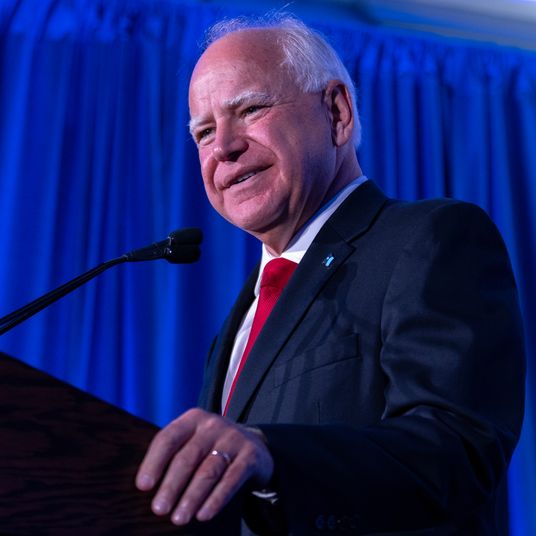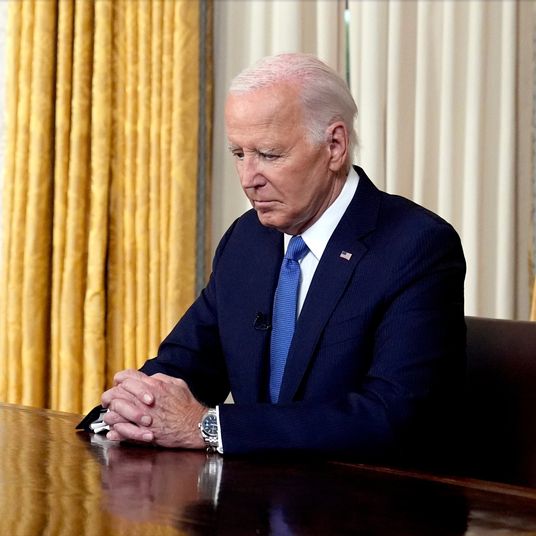
The conservative movement knows that its fiscal priorities have no democratic mandate. Thus, it has decided to simply lie to the public about what its priorities are, while exploiting our nation’s civic decay and anti-majoritarian institutions, to covertly advance its ideological goals.
The conservative movement sees “the rule of law” as a rhetorical cudgel, not a binding obligation. Conservatives will declare their unconditional fealty to that concept when they need a substance-free justification for reversing a popular policy. The moment deference to existing statutes becomes an obstacle to their own ambitions, however, conservatives will abandon their commitment to lawfulness as abruptly as they ditched their principled opposition to Donald J. Trump.
For these reasons, the movement’s approach to governance is fundamentally nihilistic. If it cannot persuade the public to oppose ambitious public-sector programs through argument, it will try to do so through sabotage. After all, the more dysfunctional “big government” becomes, the stronger the case against expanding its purview may appear. And since the movement’s gerrymandering and vast propaganda apparatus have left most Republican officeholders more accountable to the paranoid delusions of Limbaugh listeners than to the material interests of their median constituents, ideological posturing takes precedence over administrative competence.
Liberals have been writing versions of this indictment for decades. And conservatives have been contesting it for just as long. But on Monday night, Donald Trump’s Justice Department effectively declared the American right’s harshest critics correct — by announcing that it believes the judiciary must declare the entirety of the Affordable Care Act unconstitutional.
Last December, a Texas district court reached that conclusion, on grounds too specious for conservative intellectuals to defend. Specifically, Judge Reed O’Connor ruled that once Congress had repealed the individual mandate in 2017 (by setting the penalty for forgoing health insurance at $0), the rest of the ACA became illegitimate, because Congress did not intend for the law’s other provisions to exist in the absence of said mandate. To its credit, the National Review’s editorial board provided its readers with a succinct explanation for why this argument was absurd:
His ruling holds that the individual mandate can no longer be constitutionally justified as a tax now that it is set at zero, and that since Congress considered the mandate central to Obamacare when it enacted that law in 2010, the whole thing has to go. Neither half of this argument is valid.
There is, in the first place, no longer any individual mandate to justify. The Supreme Court in 2012 eliminated it as a legal requirement on individuals to buy insurance, and the Congress eliminated it as a tax in 2017. The government is no longer taking any unconstitutional action via this spectral, zero-dollar tax.
The deliberate decision by Congress to eliminate the tax without eliminating the rest of Obamacare, meanwhile, shows that Congress in 2017 no longer considered it essential to the law. (O’Connor claims that the Congress wanted to repeal Obamacare but could not reach the required supermajority in the Senate. That a majority of both chambers would have agreed on a way to repeal Obamacare is not at all clear, and not a proper subject for speculation by a court; and in any case Congress knew that a very likely outcome of passing the tax-reform bill was that most of the law would stay, but the tax would go.)
At the Washington Examiner, the conservative policy writer Philip Klein offered a similar assessment in a column titled, “I hate Obamacare, but Texas judge’s decision on its unconstitutionality is an assault on the rule of law.”
Before O’Connor’s ruling, the Trump administration had disagreed. The Justice Department has an obligation to defend duly-enacted laws against legal challenge, unless it concludes that no honest argument can be made in their favor. And last June, then-Attorney General Jeff Sessions concluded that the case against the legality of the ACA’s protections for people with preexisting conditions was too impeccable to defend. In Sessions’s view, one could not credibly claim that Congress had intended to preserve such protections when it eliminated the individual mandate (even though Congress literally voted against eliminating those protections, shortly before eliminating the individual mandate).
But after O’Connor’s ruling, and the backlash among the conservative intelligentsia, Trump’s DOJ changed its position in the case. Now, the administration claims that its own stance from last summer is indefensible: The repeal of the individual mandate did not render Obamacare’s protections for people with preexisting conditions unconstitutional — it rendered all of the law’s provisions unconstitutional, from its expansion of Medicaid to its requirement for chain restaurants to disclose the number of calories in their dishes.
This move affirms all of the criticisms of movement conservatism outlined above. Congressional Republicans tried to repeal the Affordable Care Act in 2017. They found that — even with conservative voters grossly overrepresented in both chambers of Congress (thanks to gerrymandering in the House, and malapportionment in the Senate) — their vision for health-care policy was too unpopular to enact. Thus, they disavowed that vision. In 2018, Republican candidates (including attorneys general who had brought the Obamacare challenge before O’Connor) campaigned on their support for preserving protections for preexisting conditions. Donald Trump echoed that support. Now, his administration is calling on unelected judges to eviscerate not only those protections, but also the subsidized health insurance on which more than 20 million Americans rely.
Which is to say: It is asking the judiciary to implement its heinously unpopular policy in the name of the rule of law — even though, as health-law economist Nicholas Bagley explains, that very request constitutes an assault on the rule of law.
The bad faith on display here is jaw-dropping. Does the administration really think that the very position it advanced just month ago is so untenable that it must now adopt an even crazier view?
Much as it may dislike the fact, the Trump administration has an obligation to defend acts of Congress. Absent that obligation, the sitting administration could pick and choose which laws it wants to defend, and which it wants to throw under the bus. Indeed, the decision not to defend is close cousin to a decision not to enforce the law. If the ACA really is unconstitutional, wouldn’t continuing to apply the law violate the very Constitution that empowers the President to act?
Finally, the administration’s position prioritizes ideological posturing over the public interest to a degree that can only be described as sociopathic. Paul Ryan’s attempt to repeal the ACA and replace it with a more austere public health-insurance program was cruel and contemptible. But calling on the judiciary to tear out the infrastructure of the American health-care system — and thereby, cut off 20 million Americans’ access to basic medical care, while sending the private insurance market into freefall — so as to coerce Congress into passing a more austere public health-insurance program? That isn’t a conservative cynic’s approach to policy-making; it’s a comic-book supervillain’s.
All of which is to say: Trump’s quest to repeal Obamacare by judicial fiat wraps the conservative movement’s heinous health-care agenda, contempt for popular sovereignty, indifference to the rule of law, and nihilistic approach to governance up in a single package. Democrats would be well-advised to wave that package in voters’ faces until they’re persuaded to peek inside.






























